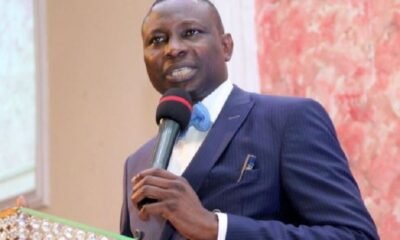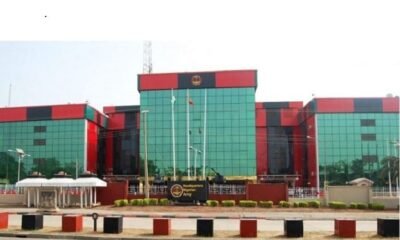Features
How not to compare Awo & Osinbajo Re: Osinbajo: Awo didn’t call cow, buoda
I refer to the article published in the PUNCH on August 5 with the title, ‘Osinbajo: Awo didn’t call cow, buoda’, written by Tunde Odesola…


ARUKAINO UMUKORO
I refer to the article published in the PUNCH on August 5 with the title, ‘Osinbajo: Awo didn’t call cow, buoda’, written by Tunde Odesola. The author, in his usual style, uses literary anecdotes to drive home his points, but then, he later unwittingly railroads himself into a cul-de-sac.
The attempt by Odesola to contrast the sage, Chief Obafemi Awolowo and the Vice President only exposes his ignorance. For those who follow the VP, his quest before and after he became the nation’s number 2 citizen, has always been comparable to Awo’s. For instance, he advocates for true federalism, including by going to court to affirm states’ rights and winning most of such cases all the way to the Supreme Court.
Besides, the VP had always harped on the need to recapture the Awo model by States in the South West region to take agriculture and Internally Generated Revenue seriously. In any case, Awo had implemented ranching while he was Premier of the old Western region, and the VP is now at the head of the National Economic Council (NEC), leading the charge on adopting ranching. More about this later.
The great English mathematician and physicist, Isaac Newton once said, ‘if I have seen a little further it is by standing on the shoulders of Giants.”. If Newton was Nigerian, today he would probably advise the author to desist from projecting subtly implied ethnic narratives against nation building.
Nevertheless, the writer did point out succinctly, “Nigeria’s insecurity is the harvest of (past) government’s years of dehumanisation of the masses.” Evidently, this is not rocket science, security challenges and hydra socio-economic challenges like poverty, unemployment were fueled by endemic corruption, mismanagement of the nation’s resources, way before the Buhari government came into office.
However, it should be stated that the Buhari government is not standing arms akimbo, but is making efforts to address security concerns and other socio-economic issues in the country. That is why stating that “Vice-President Yemi Osinbajo exemplifies the loud-on-noise-low-on-achievement image of the Buhari administration” or that the “daily acts of kidnapping have been played down by the unfeeling, do-nothing Buhari administration” is not only false, but grossly unfair by the author.
For instance, the National Social Investment Programmes (N-SIP), which is designed to address human capital development, poverty and unemployment, is unprecedented in the nation’s history. Millions of Nigerians nationwide are currently benefitting from the different schemes (N-Power job scheme, the National Home-Grown School Feeding Programme, Conditional Cash Transfer (CCT) programme and Government Enterprise and Empowerment Programme (GEEP) – MarketMoni, FarmerMoni and TraderMoni schemes) under the N-SIP, which is the largest social welfare scheme in the history of the country. How can a government doing all of that ever be described as ‘do-nothing’?
If the menace that eventually become full blown Boko Haram insurgency in the North East had been tackled years before the Buhari administration came into office in May, 2015, just maybe Nigeria would not be busy quelling terrorism.
READ: Adoke’s latest memory gaffe
Under the former administration of Goodluck Jonathan, 276 Chibok girls were kidnapped by Boko Haram insurgents from their hostels in Government Ssecondary Sschool, Chibok, Borno State on April 14, 2014. It took weeks before the former president mustered an inch of awareness about the growing national and international outrage over the issue. The former administration had swept it under the carpet as the handiwork of its political detractors. Barely little or nothing was done to secure their release. In fact, the administration for a couple of weeks flat out denied that the abduction ever took place.
Compare that to February 19, 2018, when 110 schoolgirls were abducted by Boko Haram insurgents in almost similar manner at the Government Science and Technical College, Dapchi, Yobe State. By March, 2018, the Buhari government had secured the release of all the Dapchi girls, except five who reportedly died in captivity and Leah Sharibu who is still being held by the insurgents.
Following the dogged efforts of the Buhari administration, over 100 of the Chibok girls have since been released. The Government is still making efforts to secure the release of Leah Sharibu and the remaining Chibok girls still in captivity.
Before May 2015, over 17 local government areas in Borno, Yobe and Adamawa states were under Boko Haram occupation. Under President Buhari, activities of the insurgents were decimated and all the Local Government Areas were recaptured by the Nigerian Army. Despite the splinters of attacks on soft targets, the Nigerian forces keep recoding significant victories over the insurgents.
Whether you like President Buhari or not, it is fair to say that Nigeria is not where it was pre-May 2015 when Boko Haram bombed churches and mosques in different states and the Police Headquarters and UN building in Abuja.
Secondly, the Buhari administration is making efforts to address security challenges around the country. The Nigerian Army, Air Force and other security agencies are also carrying out different operations to combat criminals and bandits nationwide. The security agencies have recorded significant gains in their efforts in battling some of these crimes.
During the meeting with traditional rulers from the South West recently, President Buhari outlined the security measures to tackle these challenges. These include revamping of police intelligence gathering capacity and significantly boosting the numbers of security personnel in local communities; community policing and improving the security architecture in states; adopting the use of drones to monitor forests and criminal hideouts, installing CCTVs on highways and other strategic locations. The VP, on behalf of the President, had already begun consultations with some traditional rulers in the South West before that meeting.
Also, any student of history would know that the farmer-herder crisis predates the Buhari administration and is indeed a fight over scarce land resources (water and pasture), which has plagues communities in some parts of the country over the years, but was not effectively addressed by previous administrations.
Criminals must be made to face the consequences of their crimes according to the laws of the land. But there have been several reports in the media of incidents blamed on Fulani herdsmen which turned out to be false. In some cases, individuals or groups have tried to hijack the narrative of ‘Fulani herdsmen’ to drive their own selfish agenda against the Buhari government.
A Yoruba proverb says, “A younger person does not give an older person history lectures.” So, Odesola need not remind us. As professor of law and Senior Advocate of Nigeria, the Vice President is familiar with the works of the Pa Awolowo. What the author failed to take into cognizance is the National Livestock Transformation Plan (NLTP), which was approved by State governors under the auspices of the National Economic Council (NEC) chaired by the Vice President.
And as an Omoluabi, the VP remains dedicated to working for the progress of Nigeria. This is evident right from his days as Attorney General in Lagos State and now Vice President.
One can also draw similarities between Pa Awo’s ranching solution, which the author outlined and that proposed by NEC; in the sense that ranching is one of the solutions proffered by the NLTP.
The NLTP (2019-2028) is a set of comprehensive strategic interventions aimed at modernizing livestock production system in Nigeria through the establishment of ranches for improved livestock productivity, while ensuring an atmosphere of peace and justice.
Significantly also, the programme would also mitigate the farmers-herders clashes as it is to be implemented in seven frontline States – Adamawa, Benue, Kaduna, Plateau, Nasarawa, Taraba and Zamfara, being States, with other states to follow.
This shows a government focused on resolving such issues, while also tackling security challenges headlong and ensuring that Nigerians are safe and secure wherever they are.
Umukoro is the Special Assistant to the President on Communications Projects, Office of the Vice President











